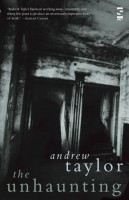 The Unhaunting by Andrew Taylor
The Unhaunting by Andrew Taylor
Salt Publishing, 2009
The Unhaunting is Andrew Taylor’s seventeenth book of poetry and comprises work written between 2003 and 2008. The collection is divided into five parts. The first, ‘The Importance of Waiting’, acts as a tidy introduction to the book’s themes of mortality, elusive truths and the environment, both as interior and exterior. Taylor begins with a vivid portrait of Perth’s suburban landscape where quiet concern spills over into the everyday. Poems become touched by apparition and by the possible threat of cancer returning to the poet after a period in remission. Even the landscape seems predisposed to such ambiguity and to its own threat of extinction. Death, dying and ghosts from the past actively haunt the pages of this book. These ghosts are not necessarily always human, often they materialise as concern, emotion and memory. They linger in a bold light and do not fade easily.
‘Maybe One Morning’ follows. It is a concise collection of translations of Italian poet and Nobel Prize winner, Eugenio Montale. These eleven translations were developed by Taylor during an Australia Council for the Arts residency at the BR Whiting Library in Rome, and Montale’s disharmony ruffles up the reader fittingly. These are poems of troubled waters, metaphorical lighthouses and coastguards, of a sea wind that rages. Again, departures and the dead, as well as general unease, spread wide across the pages like a sail.
The third part, ‘The Vanishing’ returns to Taylor’s original work and discusses recent travel and domesticity. But it is the fourth section, ‘Unhaunting’ that is the most rewarding part of this collection. It continues with the poet on his travels, firstly as a visiting academic at the Shanghai University for Science and Technology, and then on to Europe. The first three poems – ‘Shanghai High-Rise’, ‘Dust’ and ‘Roadworks, Shanghai’ – have common themes. They discuss the lonely disjointedness of someone travelling alone on business, the urban landscape of high-rise living and of the frantic redevelopment going on outside of the poet’s apartment building with an expressway below him. Such detached busyness escalates loneliness during Taylor’s ‘two months of the kindness of strangers’ (‘Dust’). He further explains that ‘it’s the stuff / of my song, of your not being here’ (‘Shanghai High-Rise’).
The remaining Shanghai poems continue with often intimate interactions with strangers. In particular a conversation that is full of words not uttered to family or friends. The poet contemplates the peculiar closeness of discussing personal matters with complete strangers. Of how two people can connect so deeply, even if they were never to meet again. Such things are intrinsically linked to the human condition, which Andrew Taylor continues to explore when he takes the reader to Poland.
Whilst the Shanghai poems are very much in the present, the European poems return to ghosts and an unsettling, mostly to do with those living scars of modern history. Taylor explores Auschwitz, a troubled underworld, of how death is often close to the skin. This theme is extended to Germany where he writes of the country’s cemeteries or friedhöfe, most notably in the town of Biebrich where the poet stands alongside his partner who interns the ashes of her mother. In ‘Friedhöfe’ Taylor explains that this was ‘a complex life / finally peaceful after her / hardest but inevitable journey.’
This subject then continues on into the title poem of the collection, which explains this woman’s past and contemplates the cause of her nocturnal restlessness while she was alive:
her failure to sleep
tormented the stairways and corridors,
rattled doors…Was it those months of fleeing
the Russian advance across Germany
on foot, hiding from German soldiers
who would have shot her on sight
that set her prowling until her wits
finally calmed her fears?
The final part of this collection, ‘The Impossible Poem’, delves into culture, reflections on long ago childhood and the discarded objects that go with it, frivolity, time passing, music and charades. As well as surf and swimming, and what these two things mean to the poet both physically and spiritually. In many ways these watery poems loop to return to the pieces from the beginning of the book, providing a nice conclusion. Taylor ends the collection with a statement about writing and that endless search for perfection in ‘The Impossible Poem’. He explains:
There are only two poems –
the one you write
and the one always undoing
your words
Although the title of this book and the title poem suggest an unhaunting is occurring, I feel that this collection reinstates the idea that as humans we are perhaps haunted by a myriad of things – by events from the past or past behaviours, by the threat of illness returning, by those small and everyday moments that become so much larger than life when a person close to you dies and all we are left with are Technicolour, surround-sound memories. Such things are a response to experience and to the very idea of how we live. While Taylor lacks the public profile of some of his contemporaries, he has quietly built up a strong body of work and The Unhaunting is testament to this.









